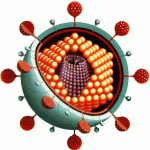Virology
|
16 december 2014 03:18:02 |
| Irregular transcriptome reprogramming probably causes thec developmental failure of embryos produced by interspecies somatic cell nuclear transfer between the Przewalski`s gazelle and the bovine (Epidemiologic Perspectives & Innovations) |
|
Tweet Background:
Interspecies somatic cell nuclear transfer (iSCNT) has been regarded as a potential alternative for rescuing highly endangered species and can be used as a model for studying nuclear-cytoplasmic interactions. However, iSCNT embryos often fail to produce viable offspring. The alterations in normal molecular mechanisms contributing to extremely poor development are for the most part unknown.
Results:
Przewalski`s gazelle-bovine iSCNT embryos (PBNT) were produced by transferring Przewalski`s gazelle fibroblast nuclei into enucleated bovine oocytes. The percentages of PBNT embryos that developed to morula/blastocyst stages were extremely low even with the use of various treatments that included different SCNT protocols and treatment of embryos with small molecules. Transcriptional microarray analyses of the cloned embryos showed that the upregulation of reprogramming-associated genes in bovine-bovine SCNT (BBNT) embryos was significantly higher than those observed in PBNT embryos (1527:643). In all, 139 transcripts related to various transcription regulation factors (TFs) were unsuccessfully activated in the iSCNT embryos. Maternal degradation profiles showed that 1515 genes were uniquely downregulated in the BBNT embryos, while 343 genes were downregulated in the PBNT embryos. Incompatibilities between mitochondrial DNA (mtDNA) and nuclear DNA revealed that the TOMM (translocase of outer mitochondrial membrane)/TIMM (translocase of inner mitochondrial membrane) complex-associated genes in BBNT embryos had the highest expression levels, while the PBNT embryos exhibited much lower expression rates.
Conclusions:
Improper degradation of maternal transcripts, incomplete activation of TFs and abnormal expression of genes associated with mitochondrial function in PBNT embryos likely contributed to incomplete reprogramming of the donor cell nuclei and therefore led to the developmental failure of these cloned embryos. |
| 153 viewsCategory: Pathology, Virology |
 Absence of a set of plasmid-encoded genes is predictive of reduced pathogenic potential in Brachyspira hyodysenteriae (Epidemiologic Perspectives & Innovations) Absence of a set of plasmid-encoded genes is predictive of reduced pathogenic potential in Brachyspira hyodysenteriae (Epidemiologic Perspectives & Innovations)Altered thyroid hormone profile in offspring after exposure to high estradiol environment during the first trimester of pregnancy: a cross-sectional study (Epidemiologic Perspectives & Innovations) 
|
| blog comments powered by Disqus |
MyJournals.org
The latest issues of all your favorite science journals on one page
The latest issues of all your favorite science journals on one page



